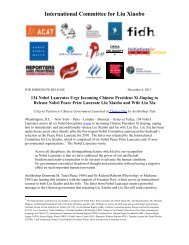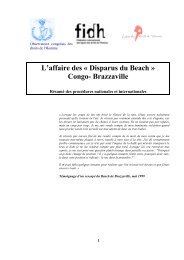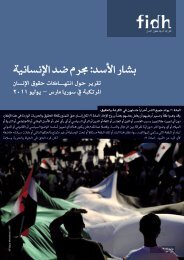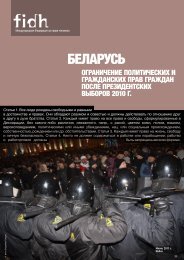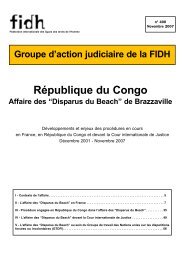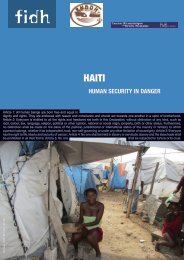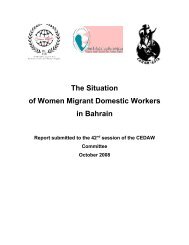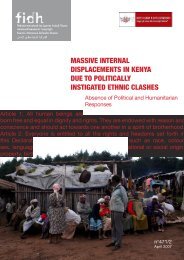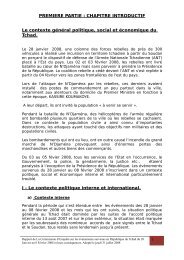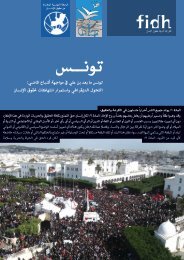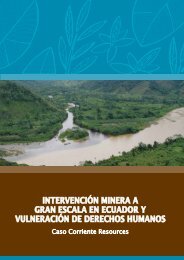of the country 87 : in particular, they were required to “show and talk regularly about the situationin other regions of the country that are calm and spared from conflict; not to refer tothe conflict as inter-ethnic, to the extent that today it is becoming obvious that it has beenprovoked by armed combatants and organised crime, benefitting the political forces thatsupport them; not to draw parallels with the events in Osh in 1990 88 , given that the causesand the character of the current events are completely different; not to permit any statementsthat directly or indirectly incriminate other ethnic groups (...)”.On June 24, on her return from an eleven-day journey to Osh, Aziza Abdirasulova (Directorof the <strong>FIDH</strong> member NGO Kylym Shamy) said she was struck by how few journalists therewere on the ground. “Many local journalists have fled, or, if they have remained, they areworking from their editorial offices and there are very few out in the street. In any case, veryfew have been seen. In Nariman, for example [where civilians died and numerous atrocitieshave been committed by the law enforcement agencies during a strong-arm “controloperation” on June 21, 2010], there were several human rights defenders, but not onejournalist. There is a huge problem, therefore, concerning news about what is happening inOsh since, apart from the information collected by defenders, the only news is informationsupplied by the authorities, and that is biased.”It is partly to try and improve the situation from this point of view that the NGO Internewscreated two emergency press centres in Osh and Djalal-Abad. These press centres providea secure, equipped place where journalists can work (while most of the editorial officeshave been destroyed by fire), and which also enables them to coordinate their work.Setting aside their competition for a while, they share information, photos and videos inorder to apportion the work in the various districts and so cover most of the city withoutthe fear of “missing out” on an important event.The Director of Internews in Kyrgyzstan, Maria Rasner, confirmed to <strong>FIDH</strong> mission membersthat: “the authorities are busy minimising the conflict. All the same, there’s no censorship.But most of the media avoid showing the horrendous things that are going on. OnlyAKIpress and www.24.kg [two of the main national press agencies] do that, but they stillcurrently receive funding from Maxim Bakiyev, they have their own agenda. One of theproblems in particular is that the media are asked to reduce the degree of violence in thepictures they publish. But the most violent pictures are accessible anyway through theRussian media, or on YouTube... which makes people even more suspicious about ourmedia 89 .” (…) “It is certain that recently we’ve seen totally biased coverage of the [June27} referendum campaign. [The recently nationalised TV channel] 5 Kanal, for example,organised a round table of jurists, experts, etc. All of them were for the draft Constitution!But on the conflict [in the south], the only bias I observed was the tendency to cover up thenumber of Kyrgyz victims, with the desire to quieten things down and for fear that Kyrgyzwould turn up from everywhere wanting revenge. Because of this, many local journalistswho would like to tell their version of the story are stopped from doing so. That partly contributesto reinforcing the idea that is widespread amongst the international organisationsand the UN, that there are only Uzbek victims. Since the region is not very well knownabroad, the international press has in general covered the Osh events very badly. Theyhave often been happy to apply a ready-made template that opposes a dominant majorityand a humiliated minority. (…) So everyone is angry with the media. The Bishkek media thatwanted to restrict publication of violent pictures was accused of censorship. On the otherhand, Osh TV and Mezon TV [media belonging to Kadyrjan Batyrov, Usbek leader of the“Rodina” party] are accused of incitement to hatred...”Strengthened political control of the media, far from calming public opinion, is leading togrowing suspicion of news sources and the institutions that control them. This contextencourages the development of rumours and conspiracy theories among the people, reinforcingsuspicion between the communities.VI.2.2 Arbitrary measures taken against journalistsThe case of Khaliljan Khudayberdiev (and Osh TV in general)Since the events in June, Osh TV and Mezon TV are the focus of attention, as they are accusedof “incitement to hatred”. These media belong to Kadyrjan Batyrov, a businessmanand Uzbek leader, and they have broadcast several documentaries “without comment”on the political meetings organised by the latter. Shortly before the riots, they broadcastan appearance by Batyrov in which he called on the Uzbeks to be careful of the Kyrgyzpolice, who, in his opinion, “do not just protect the Kyrgyz”.However, instead of being the subject of a proper investigation, Osh TV and its directorKhaliljan Khudayberdiev have been the target of a series of illegal acts of persecution.Since it is one of the rare TV channels that can be picked up in southern Kyrgyzstan anddoes not broadcast in neighbouring countries, Osh TV has become the object of a battlefor influence, at the mercy of competing appetites in the same way as are the other resourcesin the country.Reached by telephone by <strong>FIDH</strong> mission representatives ten days after the riots, the Directorof Osh TV spoke of his concerns. “On May 24, I was summoned for the first time bythe Djalal-Abad prosecutor, who wanted to know why we had broadcast one of KadyrjanBatyrov’s meetings. I replied that we had only done our job as journalists. But since [thestart of the massacres in Osh] on June 11, he brought me back three times to make a newstatement. But I had already said everything on the subject, and the road between Oshand Djalal-Abad is not safe these days. The prosecutor said he was prepared for someoneto accompany me, but I’m not happy about it, he is Kyrgyz and I am Uzbek, and I’mfrightened that comes into play. I risk ending up in prison, like Azimjan Askarov, so that theprosecutor can say that he’s done a good job and arrested ‘Uzbek extremists’... I have alawyer in Bishkek; when he’s here I’m ready to be questioned in Osh. 90 ”Osh TV was closed down for two weeks in June by decision of the mayor of the city. OnJuly 9, Khaliljan Khudayberdiev was arrested, questioned for several hours and his mobilephone was confiscated. He was released and no charge was made against him. However,the government has acquired a controlling interest in Osh TV and fired Khaliljan Khudayberdievwithout giving any reason 91 .In this way, instead of impartial investigations into their work, arbitrary measures are takenagainst journalists who are suspected by the government. These intimidation measuresare likely to have consequences for media throughout the country and contribute to increasingunrest. They act as a warning to all the independent journalists in the country.87. Ferghana.ru, 14.06.2010, “Kyrgyzstan: the interim government calls on the media to cover the events in the south of the countryon the principle of “not causing damage”, http://www.ferghana.ru/news.php?id=14977&mode=snews88. The 1990 “Osh events” that had started with clashes relating to issues of land allocation, had ended in an extremely bloody inter-ethnicconflict. As many as 35,000 Uzbeks and Kyrgyz had participated in the clashes that, according to some sources, had resulted in the deathof over 1,000 people. Sabina Tolina. “Conflict in Kyrgyzstan: questions that have long been unanswered” (Conflit au Kirghizistan : desquestions longtemps restées sans réponse). June 17, 2010. http://www.europe-asia.org/cms/index.php/asie-centrale/2-kyrgyzstan/1-conflit-au-kirghizistan-des-questions-longtemps-restees-sans-reponse (consulted on September 5, 2010)89. Here and later on in this paragraph, interview with Maria Rasner, 25.06.2010.90. Telephone interview with Khaliljan Khudayberdiev, 24.06.2010.91. On these aspects, see also the Internet site of Reporters Without Borders: Local authorities take over Osh TV after national securityraid and director’s dismissal. July 20, 2010. http://en.rsf.org/kirghizistan-local-authorities-take-over-Och-tv-20-07-2010,37983.html34 / KYRGYZSTAN <strong>FIDH</strong> – KYRGYZSTAN / 35
VII. CONCLUSIONS ANDRECOMMENDATIONSThe <strong>FIDH</strong> mission which, during its stay in Bishkek and Osh, collected a number of testimonies,observed the extent to which the weakness of the Kyrgyz government is a threatto the population in general and the independent representatives of civil society in particular.The interim government is not in a position to cope with the prevailing instability,particularly in the south of the country, where impunity reigns. The crimes of April 2010have not been elucidated. The investigations into the crimes of June 2010 have not yetbeen concluded. Crimes continue to be committed. It is likely that an independent courtwould qualify them as war crimes or crimes against humanity under the 1998 Rome Statute.The fight against impunity, whether in relation to the events of April or June 2010, islargely insufficient, while the crimes committed are particularly grave. Mission membersspoke to several members of the Uzbek minority and observed numerous situations thatbear witness to their extreme vulnerability and the lack of protection and help. The pressureput on human rights defenders and independent journalists has become systematic.Between April and June, criminal authority (which lets a crowd be fired on) gave way to anew authority that lets criminals do what they want, so violating its obligation to protectand ensure respect for human rights.Civil society representatives who call for impartial justice for the victims of the violencecommitted since April seem to be becoming the new targets of a regime that attacks humanrights defenders and the media rather than attacking the authors of the violence.Human rights defenders, lawyers, independent journalists and other civil society representativesappear to work more freely. But as soon as they become interested in sensitiveissues, they once again have to cope with pressure that is more vague but nonethelessvery serious. Despite its promises, the state shows itself to be powerless to guaranteerights that are as basic as the right to life and physical integrity. This is all the more seriouswhen very many violations are committed by officials who escape its control (the military,policemen, prosecutors, local administrations). The authorities do not guarantee autonomous,public expression for independent observers but, on the contrary, attempt to silencethem. It is a question of keeping the facts quiet to make people believe that stabilityhas returned. Yet there can be no peace without justice and without reflection on the past.The Kyrgyz authorities must at last recognise this situation and, unable to regain controlof the situation by themselves, they must ask for help from the international community.They must facilitate the establishment of fact-finding commissions into the events of Apriland June and, if necessary, consider other forms of international presence until calm hasbeen re-established.The OSCE had taken an important step by agreeing to send a police contingent to thecountry and to create an independent commission of investigation into the June events.This contingent was to be limited since it consisted of only 52 unarmed policemen. However,this limited effort was not accepted. Demonstrations took place in the country at theend of the month of July to denounce the intervention of the OSCE in Kyrgyz domesticaffairs. According to information gathered by <strong>FIDH</strong>, the demonstrations were apparentlysupported and even paid for by certain local stakeholders in order to prevent any outsiderview of the local instability. At the beginning of the month of September 2010, the Kyrgyzauthorities blocked OSCE deployment of this mission of assistance to the Kyrgyz policein the south of the country.Lack of government willingness to elucidate the crimes means that the people do not feelprotected and expect new violations of their rights every day. No institution appears to beable to protect them. Rumours spread in waves throughout the country. In this context,the organisation of parliamentary elections on October 10, 2010 will take place in a tenseand unstable context. At present the foundations of the new Kyrgyz Republic seem to beextremely fragile.Taking the situation into consideration, <strong>FIDH</strong> and itsmember organisations call on:The Kyrgyz authorities:• to close down places of illegal detention such as the basement of the Kyrgyz DramaTheatre in Osh;• to make a firm commitment to combat criminal gangs and their accomplices in thesecurity forces;• to organise an effective disarmament campaign throughout the Kyrgyz territory;• to guarantee the structural independence of the media and the nationalised media(independent editorial policy, oversight committee), of human rights defenders, lawyers,and the safety of civil society in general;• to openly and equitably judge the officials of the previous regime who are accusedof crimes and corruption and, at the same time, launch a national reconciliationpolicy and cease persecution of parliamentarians of the Ak Jol party and its allies;• to favour transparency and the criteria of competence in its policy for appointingsenior members of central, regional, police and justice officials;• to introduce reliable mechanisms for consultations on, and controlling, decrees issuedby the Interim government;• to communicate regularly and openly on the situation (safety, humanitarian) in thesouth of the country, and involve the representatives of the civil society, in compliancewith the statements made by Roza Otunbaeva on 27 June 2010;• to actively support the deployment of a mission to assist the Kyrgyz police in thesouth of the country under the aegis of the OSCE;• to request the United Nations to create an independent, international fact-findingcommission on the nature and extent of the violence on 6 and 7 April 2010 in Talasand Bishkek and on those responsible, and to guarantee the effectiveness of thecriminal enquiry;• to facilitate the work of the international, independent fact-finding commission onthe violence in the south of the country in June 2010 led by Kimmu Kiljunen; toaccept the jurisdiction of the International Criminal Court as non-party states arepermitted to do under Article 12-3 of the Rome Statute; to make sure that all thoseresponsible for committing crimes, including government officials, be brought tojustice; to closely evaluate the accusations of responsibility against members of thesecurity forces members and local administration officials;• to work towards implementation of the Convention Against Torture and Other Cruel,Inhuman or Degrading Treatment or Punishment and its Optional Protocol.The military authorities and the police in the Osh and Djalal-Abadregions and the regional prosecutors’ offices:• to stop intimidating and harassing human rights defenders and start cooperatingwith them;• to the public prosecutor of Bazar-Korgon, Ms. Jamilya Torojanova, to immediatelyauthorise an independent medical examination of Mr. Azimjan Askarov and, if tortureand physical pressure are confirmed, consider a revised trial; in the case ofappeal, to guarantee that he be given a fair, transparent trial.36 / KYRGYZSTAN <strong>FIDH</strong> – KYRGYZSTAN / 37




